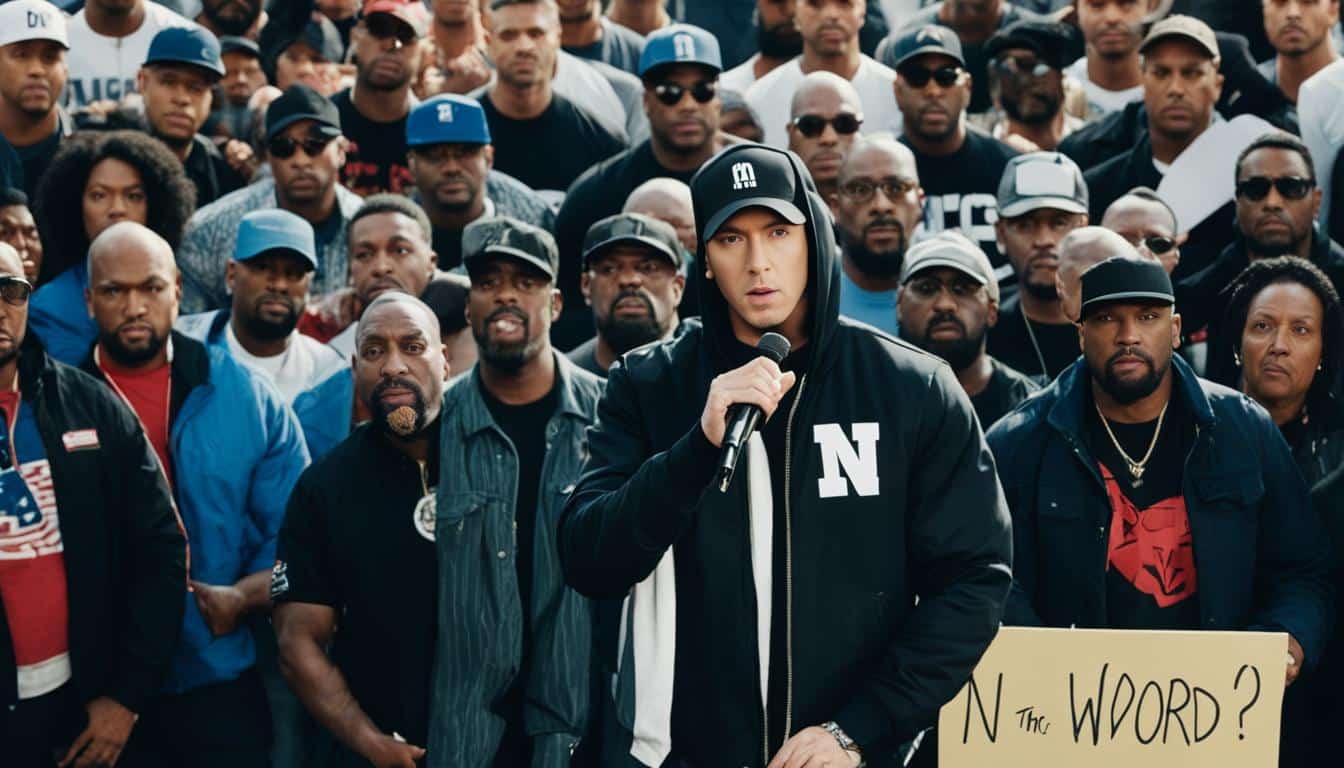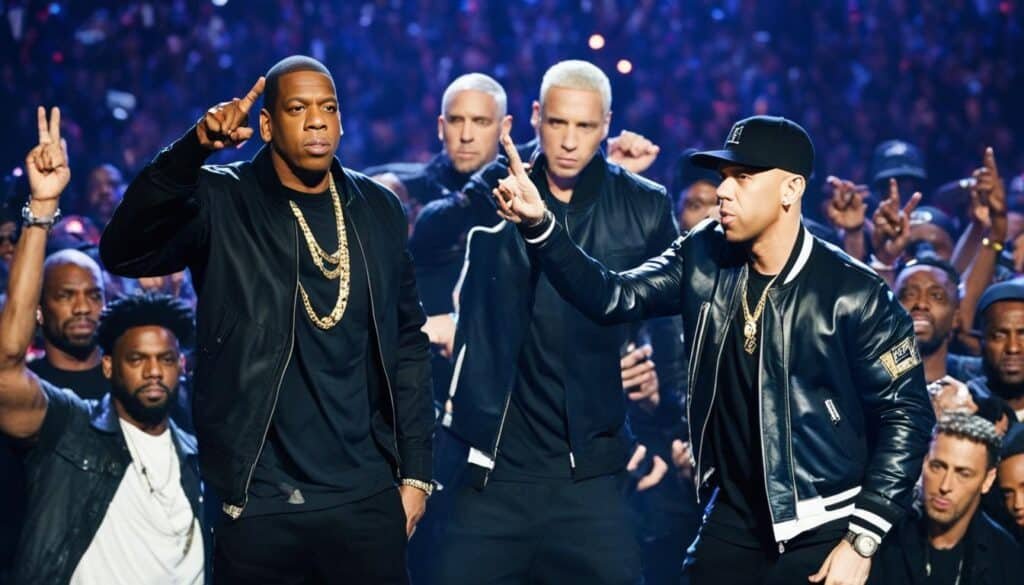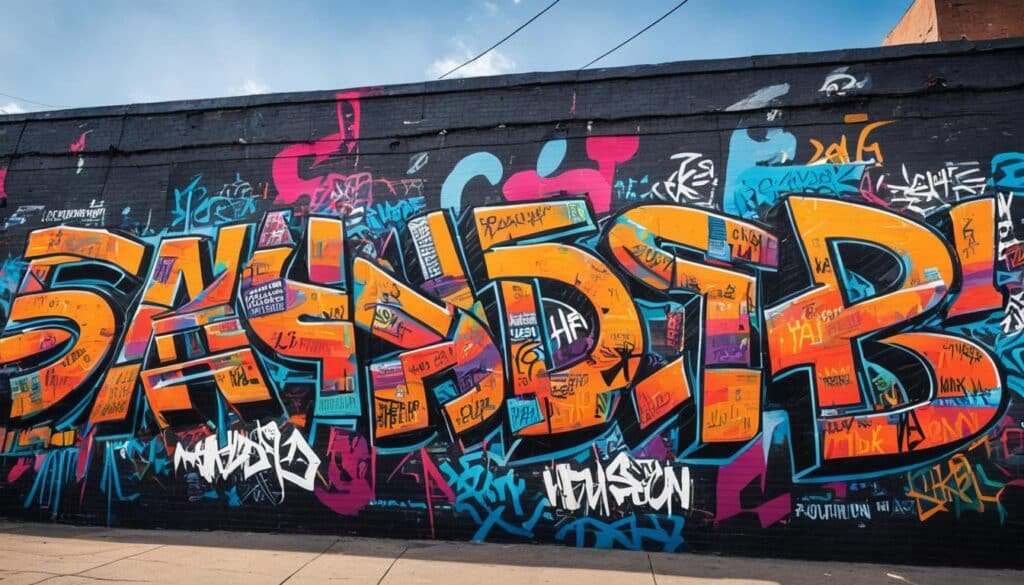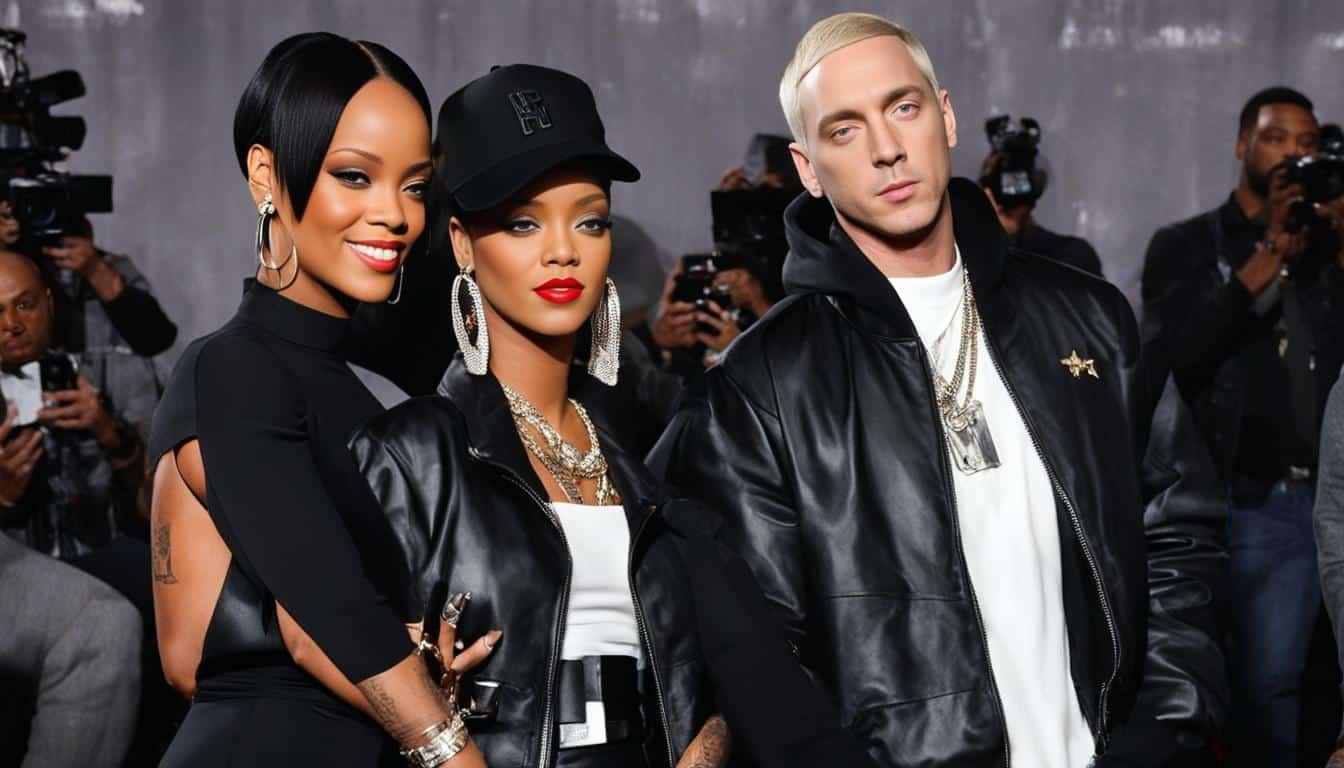Does Eminem Say the N-Word?

If you’re tuned into the hip-hop world, you’ve likely caught wind of the eminem racial controversy that has both fans and critics dissecting the legendary rapper’s lyrics. The question at the forefront: does Eminem say the n-word in his tracks? It’s a potent query, one that shakes the foundations of racial sensitivity in music. Eminem, a titan in the industry known for his sharp wit and controversial verses, has found himself enmeshed in an eminem lyrics debate. This discussion is far more than a surface-level squabble; it delves deep into the fabric of racial dynamics and the boundaries that define them within the musical sphere.
As you navigate this complex conversation, it’s crucial to understand the context and the gravity of the topic at hand. Eminem’s impact on the hip-hop community is undeniable, and the scrutiny of his language use opens up larger discussions about the evolution of racial sensitivity in music. Join us as we unpack the layers behind Eminem’s alleged use of racially charged language, the cultural implications, and the response from the community that holds a magnifying glass to the words of one of its most influential figures.
Eminem’s Response to Past Racial Slur Allegations
You’ve likely heard the buzz around Eminem’s offensive lyrics and the backlash stemming from a historical recording that targeted black women. This track, a relic from Eminem’s teenage years, not only captured a young artist’s angst but also, regrettably, included what could be interpreted as eminem racial slurs. Adapting to the unforgiving tides of public opinion, Eminem painstakingly acknowledged his past apologies, attributing his actions to the fiery imprudence of youth and an emotional state gripped by anger and hurt.
In an uncomfortable confrontation with his past, instigated by The Source magazine’s criticism, Eminem faced the music—quite literally. His mea culpas revealed an oft-overlooked aspect of fame: artists maturing in the limelight, with their lapses in judgement preserved in amber for perpetual scrutiny. Yet, amid the critique and dissection of every bar he ever spat, a question lingered—the authenticity of yet another snippet featuring racial epithets. According to some, might it have been Eminem’s voice crossing the line once more?
But take a beat, and you’ll realize there’s more to the narrative. The chasm between being ostracized and receiving support represents the duality of Eminem’s existence within the world of hip-hop. High-profile peers and segments of the audience leaned into empathy, perhaps understanding that flaws are part of the human and artistic journey. Nonetheless, the controversy over Eminem’s youthful indiscretions carved out a dialogue around eminem past apologies, forcing a broader reflection on the intersection of art, growth, and societal values.
Meanwhile, as you dissect, discuss, or nod to the rhythm of Eminem’s once-controversial verses, it’s worth considering the tension between an artist’s past and present. Have these apologies reshaped your perception of Eminem? Have they altered how you engage with the gritty and uncompromising narratives spun into the very fabric of hip-hop culture? As you ponder, remember that Eminem’s journey through apology to atonement is an echo of the broader conversations still pulsing through the veins of music communities today.
The Cultural Context of Language in Hip-Hop
As you dive into the layered world of hip-hop, you’ll find that it’s a realm which has consistently served as a voice for the underrepresented. With its origins deeply rooted in the experiences of working-class Black youth, hip-hop counterculture has evolved into a powerful form of expression that transcends racial and social boundaries. The genre’s unique use of language, especially Black vernacular English, is not merely a stylistic choice but a form of linguistic subversion and identity building.
Within the fabric of hip-hop’s narrative, eminem racial language and eminem race-related lyrics have often sparked dialogue and controversy. While Eminem’s engagement with the genre has been marked by respect for its roots, his understanding of the racial connotations of certain epithets reflects a broader consciousness within hip-hop and language identity.
The In-Group Vernacular of Hip-Hop and the N-Word
In the in-group lexicon of hip-hop, the N-word occupies a contentious yet emblematic space. This term, loaded with historical weight, is employed within the community to convey a diverse array of meanings—a sharp departure from its original derogatory intent. The linguistic subversion you witness here isn’t just about creativity; it’s a statement, a reclamation of an identity once marred by racial injustice in lyrics.
Grandmaster Caz and the Subversion of Derogatory Language
The innovative edge of hip-hop pioneers like Grandmaster Caz cannot be overstated. From the streets of the Bronx, these hip-hop elders have led the charge in transmuting derogatory language into symbols of unity and strength. Their verses encapsulate the raw essence of linguistic subversion and have paved the way for artists to explore race-related themes in their work.
Surviving Racism Through Language Evolution
Language within hip-hop serves as a testament to the resilience of a culture that has survived through the ages despite ongoing racial injustice. As eminem racial epithets highlighted the complexities of cross-cultural navigation, it also shed light on the genre’s capacity to thrive and adapt. This journey of evolution in African American language mirrors the community’s indefatigable spirit, its unyielding resolve to achieve equality through every spoken word.
Does Eminem Use the N-Word in His Lyrics?
When you dive into the provocative world of hip-hop, you often encounter the raw, unfiltered vernacular that shapes its culture. A recurring question that surfaces amidst these conversations is, “does Eminem say the n-word” in his tracks. Eminem, the rap icon known for his audacious style, has a well-documented history of steering clear of this specific controversial language in his music.
Eminem’s choice is not without intention. As a white artist revered in a space predominantly pioneered by Black individuals, he is acutely aware of the implications that come with certain words. Some might suggest his avoidance of the n-word is part of a conscious effort to respect the boundaries that come with the cultural roots and significance of the term.
It’s noteworthy that in the landscape of hip-hop—a genre that candidly deals with themes of race, violence, and class struggle—Eminem’s deliberate omission of the n-word has not gone unnoticed. Experts from linguistic and cultural fields have acknowledged his decision as an act of self-censorship, supporting the significance of the move despite Eminem’s deep integration and acceptance within the Black community. This decision has shaped the narrative around Eminem controversial language use and revealed the nuanced understanding of responsibility he carries as an artist.
Without a doubt, Eminem has crafted his language in a manner that maintains his authenticity while also respecting the culture that has embraced him. This approach has sparked discussions amongst fans and critics alike, prompting a broader dialogue regarding the use and ownership of racially charged language in the arts.
The Impact of Eminem’s Language on His Career
In the world of hip-hop, few topics have ignited as much heat as the eminem racial controversy. Eminem— a titan in the industry known as much for his raw talent as his capacity for stirring the pot—has long wrestled with accusations of eminem racial insensitivity. It’s a saga punctuated by intense hip-hop backlash, polarizing eminem offensive lyrics, and a diverse chorus of voices clamoring to weigh in on his enduring legacy.

Controversy and Backlash: Evaluating Eminem’s Credibility
When scandal surfaced, with The Source magazine unearthing tracks laden with raw, derogatory language, Eminem faced a maelstrom of criticism. Suddenly, Slim Shady’s authenticity and place in hip-hop was held up to scrutiny. The once clear-cut image of the rapper faced the taint of alleged eminem racial insensitivity, testing his credibility with a fan base that spans races and nations.
Industry Support: Jay-Z and the Hip-Hop Community’s Stance
Yet, in the furnace of public opinion, a formidable ally emerged. Jay-Z supports Eminem, solidifying a bastion of industry backing. It wasn’t just Jay; numerous figures within the hip-hop community’s reaction leaned towards defense of Eminem’s artistry. Such support stirred a broader dialogue on the intersections of race, artistic expression, and redemption in the complex tapestry that is hip-hop.
Public Perception: Fans’ Reaction to Eminem’s Past Actions
Arguably, the audience’s stance is the ultimate barometer of an artist’s standing, and in Eminem’s case, opinions have been as varied as his discography. Detractors decisively took a step back but others kept the faith, interpreting his past infractions as youth’s missteps rather than a hardened heart. The variegated response underscores not just eminem’s public apology impact on his arc but speaks volumes about the layered relationships that define the hip-hop fan base connection with their icons.
What’s clear is that Eminem’s contentious past did little to quell his influence or quiet his supporters. His dialect and delivery may be unapologetically bold, but he remains, for many, a voice of a generation—a poet whose pen cuts deep, but speaks to the real.
Racial Sensitivities in Music: Lessons from Eminem’s Journey
As you navigate the beats and rhymes of hip-hop, you’ve likely encountered the intricate debate surrounding racial sensitivity in music. Eminem’s trajectory within the hip-hop domain exemplifies this ongoing conversation. Not just a white artist in a historically Black genre, Eminem represents the frontlines of hip-hop’s double standard debate and the challenge against its evolving norms. His journey gives us insights into the genre’s nuanced dance with cultural authenticity and the process of hip-hop forgiveness.
Changing Standards and Double Standards
Breathe in the history of hip-hop, and you’ll smell the change – a genre once monolithic in its cultural ties now grapples with a kaleidoscope of voices. Eminem, once a fresh-faced interloper, now stands as a seasoned voice within this tradition. You’ve witnessed as hip-hop’s norms have been rewritten; what was once taboo, slowly became nuanced, sparking the double standard debate. Consider how Eminem’s public apology mirrors a society’s shift towards greater racial sensitivity in music.
Eminem’s Apology and Growth as an Artist
Turn the page back to Eminem’s youthful indiscretions, and you’ll find a stark contrast to the artist he has become. Your understanding of artist growth must include the ability to confront one’s past, and Eminem’s acknowledgment of his mistakes is a master class in reflection and redemption. Through his evolution, Eminem has sculpted an image of not just a rapper but a conscientious contributor to both his community and the broader scope of hip-hop.
The Ongoing Debate Over Cultural Authenticity and Forgiveness
Finally, untangle the threads of cultural authenticity and forgiveness that have ensnared the eminem racial language debate. What does it mean for you, as a listener, when an artist grapples with their history? Hip-hop’s authenticity isn’t just a static measure – it’s a living, breathing entity that demands sincerity. Your understanding of Eminem and his peers hinges on the capacity for forgiveness, an essential harmony in the symphony of hip-hop’s complex legacy.
A Comparative Look at Racial Language in Hip-Hop
As you delve deeper into the fabric of hip-hop culture, you’ll find that hip-hop racial epithets often stem from a place of historical counterculture. But it’s important to realize that this use of racial language is predominantly by Black artists, who have reclaimed derogatory terms as a form of empowerment within their community. Notably, white artists like Eminem, who has had a significant influence on the genre, have historically refrained from using such racial slurs in their music. This, in part, is due to a heightened awareness of the gravity these words carry when used outside their in-group vernacular.
Moving through the panoramic landscape of race-related lyrics in music, instances arise where artists of other ethnicities, such as Hispanic, engage with this once-taboo lexicon. A prime example is Jennifer Lopez, whose use of the n-word in her music raised eyebrows and spurred dialogue about who has the privilege—or the right—to employ these race-related lyrics in music. Her case, among others, spotlights the complexities surrounding racial language within the hip-hop sphere.
Conversations you hear may stretch to the broader music industry, demanding introspection from both creators and consumers alike. Comparing the language used by artists from different racial backgrounds isn’t just about pinpointing who can say what. It’s about understanding the layered nuances of these words, their evolution in meaning, and how they reflect the societal currents at play.

And while Eminem himself has been the center of controversy over the years, notably for past recordings embracing Eminem racial slurs, his journey illustrates a broader cultural shift. It’s a shift towards greater racial sensitivity and respect within the music industry – a challenging but necessary evolution for a genre that continues to inspire and influence millions. Your perception of Eminem’s lyrics and his role in the hip-hop narrative may be deeply personal. However, it’s undeniably shaping the ongoing dialogue about race, language, and artistry in America’s ever-vibrant music scene.
Responsibility and Self-Censorship: Can Artists Influence Behavior?
Imagine the power an artist holds—able to sway opinions and start conversations with just a few carefully chosen words. The question of whether artists like Eminem wield enough influence to shape the behavior and perspectives of their audience is as pertinent as ever. Particularly when it comes to sensitive topics like the use of racially charged language in music, the responsibility falls heavily on their shoulders. How these artists depict and handle such issues could potentially start a cultural revolution—or reinforce damaging norms.
Piers Morgan’s Stance and the Power of Cultural Icons
You’ve seen it unfold: a single statement from a media personality ignites a firestorm of debate. Piers Morgan’s firm stance against the **n-word** is just one example of how cultural icons influence the conversation around language responsibility. How they choose to address these contentious issues, whether in favor of complete eradication or selective usage, leaves a mark on public sentiment and impacts the rationales behind societal norms.
Suburban Influence on Hip-Hop Consumption and Norms
It might intrigue you to know that hip-hop’s heartbeat is powered significantly by suburban youths whose engagement affects hip-hop suburban consumption and racial language norms. With artists like Eminem bridging the gap between urban centers and the suburbs, the scope of hip-hop’s impact on language use expands. Thus, the artist’s role in shaping these norms through their work is undeniable.
The Role of Artists in Shaping Conversations Around Offensive Language
Fans hang on to their every word, but how often do artists actually lead by example? Eminem’s conscious decision to steer clear of the n-word is a poignant illustration of self-censorship and censorship in hip-hop. His actions raise the bar and challenge fellow artists to consider the ramifications of their words carefully, thereby actively shaping culture and potentially curbing the use of offensive language in music.
Conclusion
The discourse surrounding Eminem’s relationship with the n-word has served as a focal point for a broader conversation, illuminating core issues prevalent within the fabric of hip-hop culture. The controversies highlight the need for racial sensitivity and authenticity, challenging not only Eminem but the entire music industry to consider the intricate power dynamics that shape artistic expression. As a cultural icon within this genre, Eminem’s journey from being embroiled in a racial controversy to becoming a venerated figure within the hip-hop community exemplifies the importance of growth, reflection, and the willingness to evolve with the times.
Throughout the span of his career, Eminem’s navigation through thorny issues of race and language has sparked discussions about the hip-hop cultural impact and the substantial role artists play in influencing societal standards. By consciously avoiding the use of the n-word, Eminem has set a precedent for respecting cultural sensitivities—a move that not only reflects an understanding of the genre’s heritage but emphasizes the artist’s responsibility in promoting a message of respect and inclusion.
In assessing Eminem’s legacy, it’s apparent that his influence extends far beyond chart-topping hits and bravura performances. The narrative of his evolving language and the stance he’s taken against using racially charged terms will likely be as much a part of his legacy as his musical prowess. By facing the controversy head-on and choosing a path of personal and artistic growth, Eminem has played a definitive role in shaping the conversation around the use of language in hip-hop, leaving a blueprint for how artists might handle similar challenges with integrity and intention.
FAQ
Does Eminem say the n-word in his music?
Eminem does not use the n-word in his lyrics. He is a white artist who, despite his deep integration into hip-hop culture, has made a conscious decision to avoid using this particular racial slur in his songs.
What was Eminem’s response to past allegations of using racial slurs?
In the past, Eminem has faced backlash for a song recorded in his teenage years where he used offensive language towards Black women. Eminem addressed the controversy by admitting his wrongdoing and stating that it was a result of anger and frustration during his younger years. He has since apologized and refrained from using such language.
How does the in-group vernacular of hip-hop contribute to the use of the n-word within the culture?
Hip-hop emerged as a counterculture primarily created by and for working-class Black youth. Within this community, the n-word developed into a term of camaraderie, competition, and solidarity, which carries different connotations from its historically derogatory meaning. It has become a complex linguistic element that is deeply embedded in the identity and expression of hip-hop culture.
What stance does Grandmaster Caz take on the use of derogatory language in hip-hop?
Grandmaster Caz, a respected early hip-hop figure, illustrates through his lyrics how the n-word can be used within the Black community to empower and subvert its derogatory origin. His work showcases the word’s transformation into a symbol with multiple, often positive meanings within the hip-hop context.
How has racial language in hip-hop evolved over time?
Racial language in hip-hop, particularly the use of the n-word, has undergone significant transformation. Artists have repurposed the term as a means of identity, resistance, and empowerment, reflecting the tenacity of the Black community in the face of racism. This evolution signifies both survival and the continuous battle against racial injustice.
Has the controversy over use of racial language impacted Eminem’s career?
Eminem’s career has indeed been challenged by controversies over past use of racial language. Discussions around his authenticity and the impact of previous actions on his credibility have arisen from these incidents. Nevertheless, figures within the industry, like Jay-Z, have shown support for Eminem, highlighting a nuanced public perception and fan base that continue to recognize his artistic impact and personal growth.
Can artists like Eminem influence the norms around offensive language in music?
Yes, artists hold significant power in shaping societal conversations around the use of language. Eminem’s decision to avoid the n-word is a conscious approach to align with values of racial sensitivity and respect. Such choices can potentially influence norms and standards within the music industry and its audience, especially given the influential platform artists possess.
How do changing standards and perceptions affect double standards regarding racial language in hip-hop?
Changing standards and perceptions in society can affect what is considered acceptable within cultures like hip-hop. Double standards may arise when members of different racial groups use racially charged language, leading to debates about who can or cannot use certain words. Eminem’s journey, including his avoidance of the n-word, highlights the evolving norms on racial sensitivity in the music industry.
What is Piers Morgan’s stance on the use of the n-word and how do cultural icons play a role?
Piers Morgan has advocated for the complete cessation of the n-word’s use by all parties, including within the Black community. This viewpoint underlines the influence cultural icons can have on societal behavior and norms. Such figures often provoke conversations that lead to reflection on the broader scope of cultural and sociolinguistic practices.
How does suburban consumption of hip-hop affect the norms around racial language?
Suburban youth significantly contribute to the consumption of hip-hop and thereby affect its norms surrounding racial language. As the genre has reached mainstream audiences, including those from suburban areas, it has had to navigate a cross-cultural reach and the diverse sensibilities that come with an expanded fan base. Eminem’s widespread appeal exemplifies these dynamics.




Leave a Comment